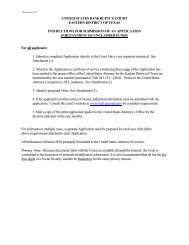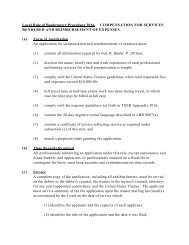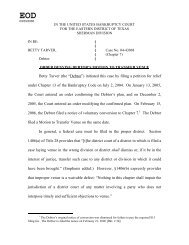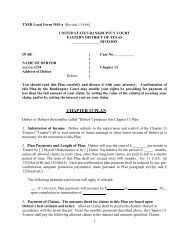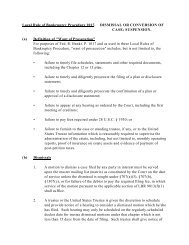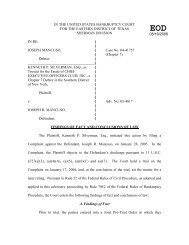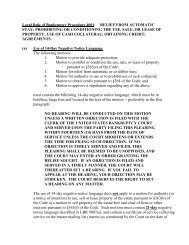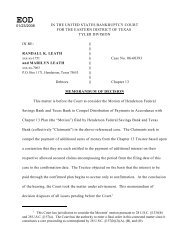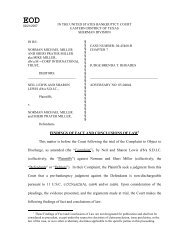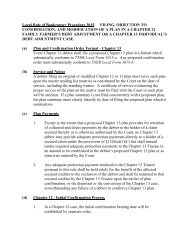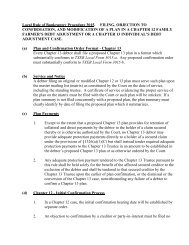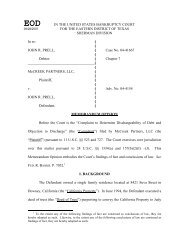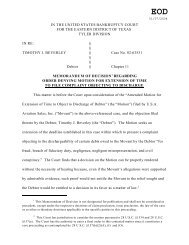EOD - Eastern District of Texas
EOD - Eastern District of Texas
EOD - Eastern District of Texas
Create successful ePaper yourself
Turn your PDF publications into a flip-book with our unique Google optimized e-Paper software.
<strong>EOD</strong>01/27/2010IN THE UNITED STATES BANKRUPTCY COURTFOR THE EASTERN DISTRICT OF TEXASSHERMAN DIVISIONIN RE: §§BRIAN A. UNDERWOOD and § Case No. 07-50014TRACY E. UNDERWOOD, § (Chapter 7)§Debtors. §_________________________________§§BEN AND SYLVIA HATRIDGE §LIVING MANAGEMENT TRUST, §§Plaintiff, §§v. § Adv. Proc. No. 07-5006§BRIAN A. UNDERWOOD and §TRACY E. UNDERWOOD, §§Defendants. §MEMORANDUM OPINION REGARDING PLAINTIFF’SMOTION FOR SUMMARY JUDGMENTThe Ben and Sylvia Hatridge Revocable Living Management Trust initiatedthis proceeding against the debtors, Brian and Tracy Underwood, seeking anondischargeable judgment in the principle amount <strong>of</strong> $594,000 based on fraud orfalse pretenses pursuant to 11 U.S.C. § 523(a)(2)(A). The Trust alleges that, inconnection with five separate loan transactions, the debtors knowingly made falserepresentations in order to obtain funds. The debtors initially denied the Trust’sallegations. However, after filing their answer to the Trust’s complaint, the1
debtors pleaded guilty to charges <strong>of</strong> fist degree felony theft in a state criminalaction relating to the same five loan transactions. 1The Trust brings the present Motion for Summary Judgment pursuant toFederal Rule <strong>of</strong> Bankruptcy Procedure 7056. That rule incorporates Federal Rule<strong>of</strong> Civil Procedure 56, which provides that summary judgment shall be rendered“if the pleadings, depositions, answers to interrogatories, and admissions on file,together with the affidavits, if any, show that there is no genuine issue as to anymaterial fact and that the moving party is entitled to judgment as a matter <strong>of</strong> law.”Celotex Corp. v. Catrett, 477 U.S. 317, 322 (1986) (quoting FED. R. CIV. P. 56(c)).The party seeking summary judgment always bears the initial responsibility<strong>of</strong> informing the court <strong>of</strong> the basis for its motion, identifying those portions <strong>of</strong> the“pleadings, depositions, answers to interrogatories, and affidavits, if any,” which itbelieves demonstrates the absence <strong>of</strong> a genuine issue <strong>of</strong> material fact. Celotex,477 U.S. at 323. The manner in which the necessary summary judgment showingcan be made depends upon which party will bear the burden <strong>of</strong> persuasion at trial.If, as in this case, the burden <strong>of</strong> persuasion at trial is on the moving party, “thatparty must support its motion with credible evidence -- using any <strong>of</strong> the materialsspecified in Rule 56(c) -- that would entitle it to a directed verdict if notcontroverted at trial.” Celotex, 477 U.S. at 331 (Brennan, J., dissenting); Groganv. Garner, 498 U.S. 279, 286 (1991).1 Under <strong>Texas</strong> law, a person commits the <strong>of</strong>fense <strong>of</strong> theft if that person “unlawfully appropriatesproperty with intent to deprive the owner <strong>of</strong> the property.” TEX. PENAL CODE § 31.03(a). Appropriation <strong>of</strong>property is unlawful if it is “without the owner's effective consent.” Id. at § 31.03(b)(1). A theft is a firstdegreefelony <strong>of</strong>fense if the value <strong>of</strong> the property stolen is $200,000 or more. Id. at § 31.03(e)(7).2
Summary judgment is mandated against the party who fails to make ashowing sufficient to establish the existence <strong>of</strong> an element essential to that party’scase and on which that party has the burden <strong>of</strong> pro<strong>of</strong> at trial. See FED. R. CIV. P.56(e); Celotex, 477 U.S. at 322. Factual controversies are resolved in favor <strong>of</strong> thenonmoving party, see Matsushita Elec. Indus. Co. v. Zenith Radio Corp., 475 U.S.574, 587 (1986), but only when there is an actual controversy -- that is, when bothparties have submitted evidence <strong>of</strong> contradictory facts. See Little v. Liquid AirCorp., 37 F.3d 1069, 1075 (5 th Cir. 1994). Here, the debtors have not submittedany argument or evidence in opposition to the Trust’s motion. Indeed, at thehearing on the Trust’s motion, counsel for the debtors conceded that the elements<strong>of</strong> the crime <strong>of</strong> theft under <strong>Texas</strong> law satisfies all <strong>of</strong> the elements necessary for thePlaintiff to succeed on a claim <strong>of</strong> fraud <strong>of</strong> false pretences under § 523(a)(2)(A).See TEX. PENAL CODE § 31.03. Cf: In re Niswonger, 116 B.R. 562 (Bankr. S.D.Ohio 1990) (debt held nondischargeable under § 523(a)(2)(A) where debtorspleaded guilty to theft and fraud under Ohio law).The Court, having reviewed the Trust’s motion and supporting affidavits, aswell as the record in this proceeding, concludes that the Trust has carried itsburden <strong>of</strong> establishing the absence <strong>of</strong> a genuine issue <strong>of</strong> material fact with respectto its § 523(a)(2)(A) claim. The uncontroverted evidence establishes that thedebtors knowingly made false representations to the Trust with the intention <strong>of</strong>inducing the Trust to provide them with funds, the Trust justifiably relief on suchrepresentations by advancing funds to the debtors, and the Trust sustained3
$594,000 in losses as a proximate result <strong>of</strong> the debtors’ false representations. 2 TheCourt will enter a separate Judgment in favor <strong>of</strong> the Trust consistent with thisMemorandum Opinion.Signed on1/27/2010SRHONORABLE BRENDA T. RHOADES,UNITED STATES BANKRUPTCY JUDGE2 Although the Plaintiff’s complaint and motion request an award <strong>of</strong> attorneys’ fees, the Plaintiff didnot provide the Court with any evidence <strong>of</strong> such fees in connection with its request for summary judgment.The Plaintiff also has not supported its request for pre-judgment interest with evidence <strong>of</strong> the contractualrate <strong>of</strong> interest in any <strong>of</strong> the loan transactions. Section 1961(a) <strong>of</strong> Title 28 provides for a federal rate <strong>of</strong>interest, but this rate applies only to interest accrued post-judgment. See Chapman & Cote v. Itel ContainerInt’l, 865 F.2d 676, 689 (5 th Cir. 1989).4



